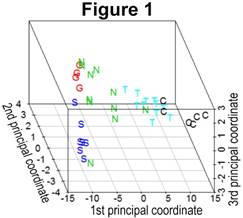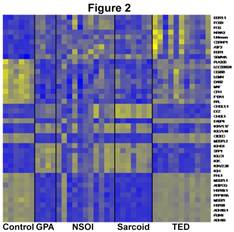Background/Purpose: Gene expression profiling provides diagnostic and therapeutic information in several malignancies, but its role in evaluating inflammatory disease is relatively untested. We hypothesized that gene expression profiling could provide diagnostic information for orbital inflammatory diseases which include thyroid eye disease (TED or T in Figure 1), sarcoidosis (S in figure), granulomatosis with polyangiitis (GPA or G in figure), or nonspecific orbital inflammation (NSOI (N in figure), previously known as pseudotumor).
Methods: Formalin-fixed orbital biopsies, 20 from healthy controls (C in Figure 1), 25 from subjects with NSOI, 25 from subjects with TED, 6 from subjects with GPA, and 7 from subjects with sarcoidosis were obtained by an international consortium, divided into discovery and validation sets, and analyzed with regard to histopathology and gene expression using microarray.
Results: Principal coordinate analysis (Figure 1), heat maps (Figure 2), and Venn diagrams showed distinct gene expression profiles for healthy controls and subjects with TED, GPA, or sarcoidosis. A statistical method called random forest based on 39 probe sets identified controls, GPA, or TED with an average accuracy of 76% (p=0.02 compared to random) while two expert pathologists had accuracies of 49% and 58% respectively (neither significant compared to random). Random forest analysis indicated that 52% of tissues from patients with nonspecific inflammation were consistent with a diagnosis of GPA.
Conclusion: Molecular diagnosis by gene expression profiling is more accurate than histopathology in differentiating forms of orbital inflammatory disease. Although NSOI is a heterogeneous collection of diseases, many patients with NSOI have a gene expression profile resembling GPA. A limited form of GPA affecting the orbit is far more common than previously realized. Molecular diagnosis should be tested for its ability to identify GPA affecting sinuses and nasal or subglottic mucosa.
Disclosure:
J. T. Rosenbaum,
Genentech and Biogen IDEC Inc.,
2;
D. Choi,
None;
C. Harrington,
None;
P. Stauffer,
None;
D. Wilson,
None;
S. Gupta,
None;
R. Dailey,
None;
J. Ng,
None;
E. Steele,
None;
P. Yeatts,
None;
P. Dolman,
None;
V. White,
None;
G. Harris,
None;
C. Czyz,
None;
J. Foster,
None;
D. Edward,
None;
H. Alkatan,
None;
B. Korn,
None;
D. Kikkawa,
None;
D. Selva,
None;
S. Dubovy,
None;
C. Alabiad,
None;
D. Tse,
None;
M. Kazim,
None;
P. Patel,
None;
S. R. Planck,
None.
« Back to 2014 ACR/ARHP Annual Meeting
ACR Meeting Abstracts - https://acrabstracts.org/abstract/molecular-diagnosis-reveals-a-surprising-prevalence-of-limited-gpa-among-patients-with-orbital-inflammatory-diseases/


